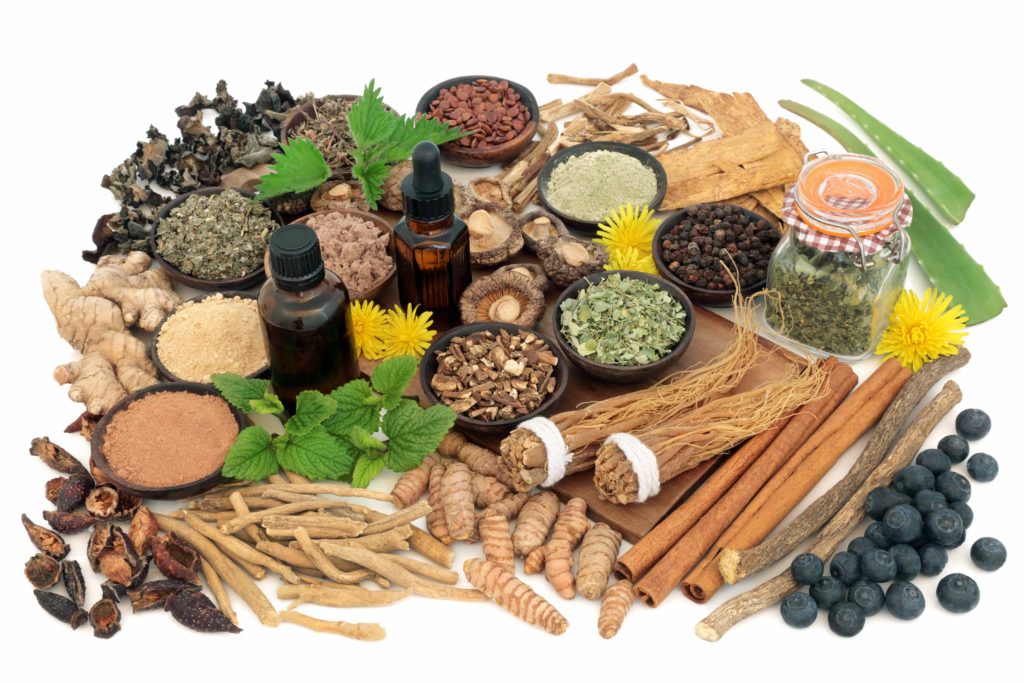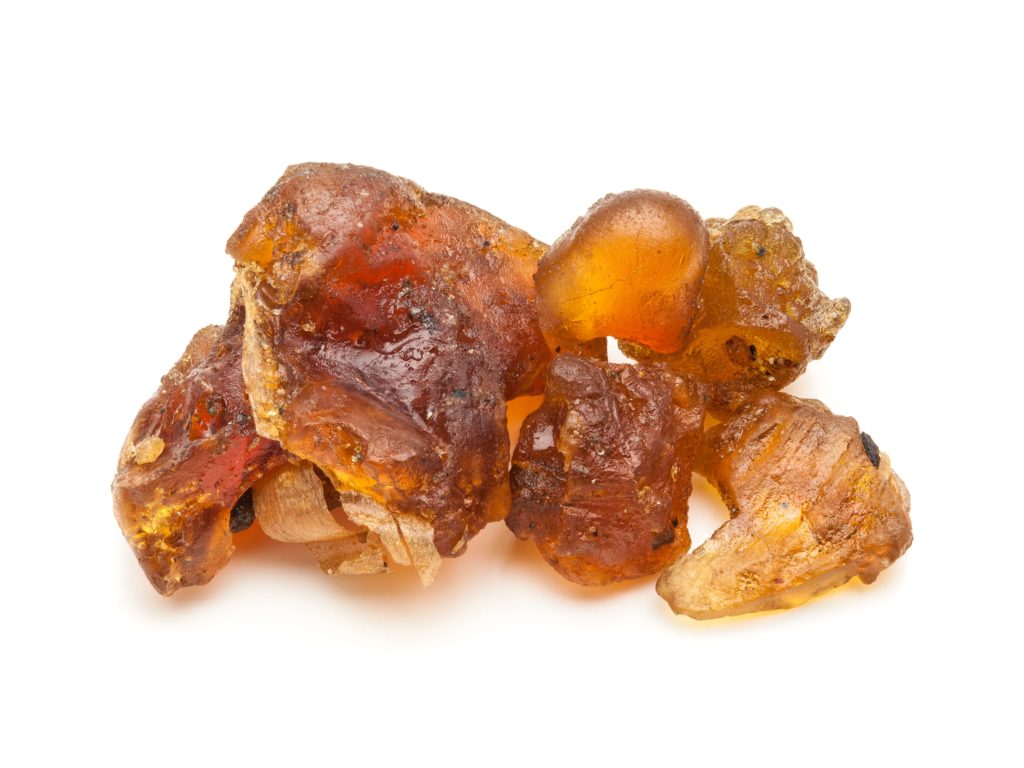Herbs are small plants that bear leaves, flowers, or seeds that have medicinal or culinary value. Ancient medicinal practices like Ayurveda and Unani and more contemporary modern techniques like Naturopathy use herbs as their core therapeutic ingredients.
Ayurveda is an ancient medical science that originated in India and has garnered much fame and attention. Several Ayurvedic principles are intricately connected with the practice of Yoga. (READ our blog on the influence of Ayurveda on Yoga)
Ayurvedic therapy is based on the classifications of people by personality, dietary habits, and inherent tendencies. Yoga can complement Ayurvedic treatment with its natural healing effect on the person’s overall well-being. Similarly, Ayurvedic preparations can change the way one practices Yoga.

Let us embark on a journey to know some common and rare herbs that enhance your physiological functions and make Yoga practice easier.
Enhance Your Yoga Practice With These Herbs
1. Brahmi
Brahmi is a popular herb used to prepare several Ayurvedic medicines. Brahmi, also known as water hyssop, finds immense utility for its positive effects on brain functions.

- Botanical Information
Brahmi is a short creeper predominantly found in the wet soil of tropical countries like India, China, Pakistan, and Vietnam. Its leaves and flowers are loaded with natural and organic compounds with immense medicinal value. Natural Brahmi extract is bitter and is treated before the medicine is used.
The medicinal extract obtained from the Brahmi plant is made into tablets, powders, oils, and syrups to make it fit for human consumption.
- Utility In Yoga
Brahmi is a brain tonic that sharpens your memory and revitalizes your brain functions. Those who practice Yoga to sharpen their memory or improve their cognitive functions may benefit significantly from Brahmi. Brahmi soothes agitated nerves and is a great way to relax your mind before you embark on a spiritual journey with meditation.
- Contraindications
Brahmi is unsuitable if you have sluggish digestion, weak lungs, and a hypoactive thyroid gland. Pregnant women and lactating mothers must consult with an Ayurvedic doctor before consuming Brahmi in any form.
2. Ashwagandha
Ashwagandha, also known as winter cherry, is an evergreen herb with immense medicinal value. The bitter extract from the herb is loaded with therapeutic properties useful in Ayurvedic treatment.

- Botanical Information
The Ashwagandha herb is native to India but also grows in some parts of Africa. The herb bears yellowish flowers, small green leaves, and orange-colored berry-like fruits. The roots of the Ashwagandha plant carry a distinct smell. The roots are dried, crushed into a powder, and mixed with other compounds to make them suitable for medicinal purposes.
- Utility In Yoga
Ashwagandha is known for its medicinal effects against the harmful effects of stress. Consumption of Ashwagandha clears your mind from emotional burdens and negativity, allowing you to pursue Yoga more effectively for better health. The anxiolytic properties of Ashwagandha extract make it suitable for consumption by those who seek to calm their mind and find spiritual enlightenment with Yoga. Ashwagandha perfectly complements the role of Yoga in curbing the ill effects of diabetes.
- Contraindications
Ashwagandha extract can stimulate uterine contractions and should be avoided by pregnant or menstruating women.
3. Tulsi
Tulsi, or holy basil, is well known for its cooling effect on the mind and body. (READ our blog on the benefits of Tulsi)
The extract obtained from Tulsi leaves used to manufacture syrups, capsules, and powders for medicinal value.

- Botanical Information
Botanists classify the Tulsi plant as a shrub that bears leaves year-round. Tulsi leaves grow in bunches on thin stems which end in pointed spikes bearing tiny purple flowers. Tulsi leaves are fragrant and have excellent medicinal value.
- Utility In Yoga
Yoga is an excellent way to stretch your muscles and give them some much-needed exercise. Tulsi will relax your body muscles and allow you to perform Yoga better. Tulsi is also a potent detoxifying agent, which makes it pair very well with Yoga. Yoga postures and Pranayama also focus extensively on cleansing and detoxifying the mind, spirit, and body.
If you are practicing Yoga to heal any existing respiratory conditions, consuming Tulsi will considerably enhance your efforts.
- Contraindications
While Tulsi has no known contraindications, pregnant women and breastfeeding mothers should not consume it unless absolutely necessary. Patients battling thyroid disorders may consult with their primary doctor before using Tulsi preparations as medicine.
4. Turmeric
Turmeric is used regularly in the kitchens of most Asian and middle eastern households. (CLICK here to learn more about turmeric)
Turmeric roots are dried and used whole or in powdered form as a medicine.

- Botanical Information
The Turmeric plant is perennial, and its roots are the most sought-after part of the plant. Turmeric root resembles ginger root as both plants are classified under the same botanical group. Since the turmeric plant thrives in a tropical environment, it grows abundantly in East Asian countries like India, Sri Lanka, and some parts of South America.
- Utility In Yoga
Turmeric is a potent antioxidant that preserves your internal organs’ cellular integrity and functions. Consumption of turmeric will enhance your Yoga practice by keeping your musculoskeletal tissue in good health. Turmeric also causes mental relaxation, thus making it easier to meditate during your Yoga session.
Turmeric is a great way to release a blocked throat chakra, the fifth primary chakra of the human body. You can genuinely benefit from the practice of Yoga when all your chakras are aligned with one another. (READ more about the primary chakras)
- Contraindications
There are no known predominant contraindications of turmeric. However, it is advisable to consult with an Ayurvedic physician if you want to consume turmeric for medical purposes.
5. Guggul
Guggul is a short plant that yields a resinous material with incredible medicinal properties. (Refer to the below image)
Almost all parts of the plant are rich in organic compounds used in preparing Ayurvedic medicines.

- Botanical Information
The Guggul plant is known among Botanists as Commiphora wightii. The plant has thorned branches and a fragile bark. The bar yields a gum-like resin that is harvested for its therapeutic properties. Guggul is classified as a shrub and grows in certain parts of India and Pakistan.
- Utility In Yoga
Guggul strongly affects human metabolism and assists in healthy weight loss. Those who practice Yoga to reach their ideal weight goals may benefit by consuming Guggul-based medication. The anti-inflammatory properties of Guggul make your joints more supple, allowing you to practice Yoga without developing pain and swelling in your joints.
Guggul resin is a potent antioxidant that increases your physical stamina, thus enhancing your Yoga practice.
- Contraindications
Patients with bleeding disorders, liver conditions, and blood pressure disturbances should avoid guggul-based herbal preparations. Pregnant women, breastfeeding mothers, and women taking oral contraceptives should avoid Guggul preparations.
6. Dashamula
Dasha means ten, and Mula means roots. Dashamula is not a single herb but a medicinal combination that combines extracts or powders from ten plants.
- Botanical Information
The ten herbs that make up the formula of Dashamula are:
- The roots of Agnimantha, Shyonaka, Kashmari, and Patiala.
- The herbal extracts of Bruhati, Kantakari, Shalaparni, and Prushniparni.
- The fruits of Bilva and Gokshura.
All ten plants grow abundantly in various regions of India.
- Utility In Yoga
Dashmula is a muscle tonic that relaxes and rejuvenates exhausted muscles and increases their suppleness. Consuming Dashamula will enhance your practice of Pranayama, allowing you to develop better lung functions. Dashamula balances your Vata dosha by removing excess of it from your body. Thus, Dashamula complements the efforts of Yoga in attaining harmony between the various aspects of human health.
Dashamula is also a potent detoxifying agent that will cleanse your mind, body, and soul and let you soak in all the benefits of your Yoga practice.
- Contraindications
While no known contraindications exist for consuming Dashamula, lactating mothers should proceed cautiously. Dashamula is a uterine tonic and may not be suitable during specific stages of pregnancy and your menstrual cycle.
7. Sandalwood
Sandalwood is a tall tree coveted for its fragrant bark and trunk. Oils, powders, creams, and other products obtained from the sandalwood tree are used abundantly for their cosmetic and medicinal properties. (LEARN more about the mighty sandalwood tree and its applications)
The below image is a pictorial reference to the appearance of Sandalwood tree bark.

- Botanical Information
Santalum album is the name that botanists have given to the sprawling sandalwood tree. The tree has a thick, strong trunk and robust roots and grows as tall as 10 meters. The tree is hemiparasitic, which implies it relies on neighboring trees for nutrition. Sandalwood tree grows in tropical countries like India, Indonesia, and some parts of Australia. The tree’s bark is predominantly used in medicinal preparations.
- Utility In Yoga
Sandalwood powder, paste, and oils have a calming and soothing effect on agitated nerves. In the ancient era, Yogis used sandalwood incense to create a serene environment while they meditated. Sandalwood has anti-inflammatory properties that keep your joints healthy, allowing you to practice Yoga without any physical restrictions.
The peculiar fragrance of Sandalwood opens and aligns the base chakra, which helps you in your journey of spiritual enlightenment.
- Contraindications
There are no known factors that contraindicate the use of Sandalwood. But consuming any medicated sandalwood preparations is advisable only with an Ayurvedic doctor’s prescription.
Dos And Donts Of Consuming Herbal Remedies
Herbs, shrubs, and plant extracts are the most natural sources for commercializing Ayurvedic medicines. Ayurvedic principles dictate that the plant extracts be used in an unadulterated form, making them very safe and highly effective in most cases. However, excess or wrongful consumption of any medicine is harmful to health. Therefore, it is crucial to remember a few rules before consuming any herbal medicinal preparation.
- Please consult with your primary doctor and an Ayurvedic doctor before using herbal medicines.
- Inform your Ayurvedic doctor of your health history, allergies, and ongoing medication. This helps your doctor to formulate a herbal formula suited to your health requirements.
- Herbal medicines have potent organic components that can cause harmful effects on your health if consumed in excess. It is inadvisable to consume herbal preparations daily without any indications.
- Yogic and Ayurvedic principles advocate using herbs to influence your physiology, chakras, and immunity. However, to be effective, one must consume the herbs only with an Ayurvedic prescription.
- Using herbs or shrubs in their raw form may only sometimes be ideal to benefit from their medicinal properties.
The principles of Yoga and Ayurveda often overlap, proving how they are intricately bound together. Yoga is among the most effective ways of living a wholesome lifestyle, and its efficacy greatly multiplies when Ayurvedic techniques supplement it.







